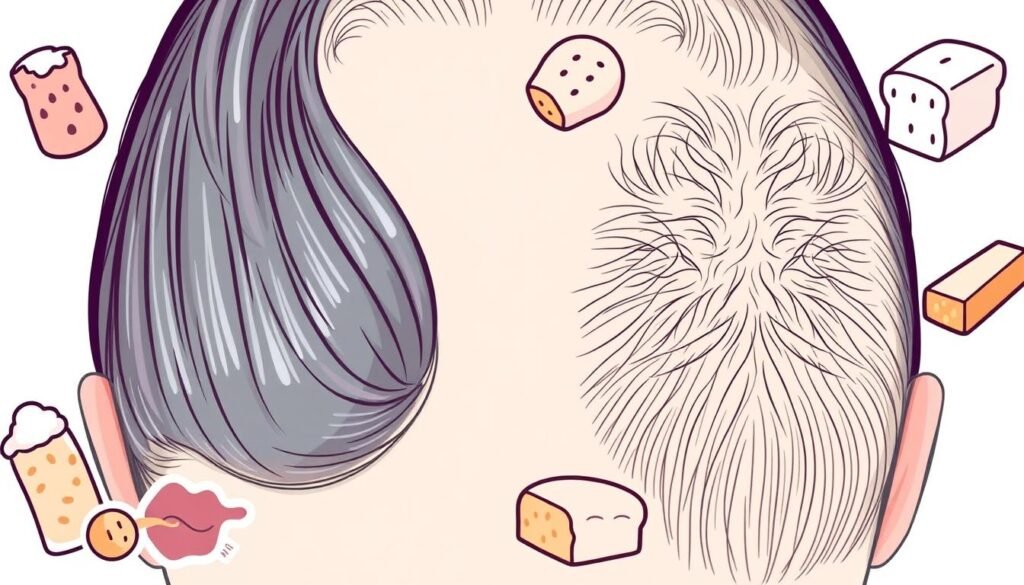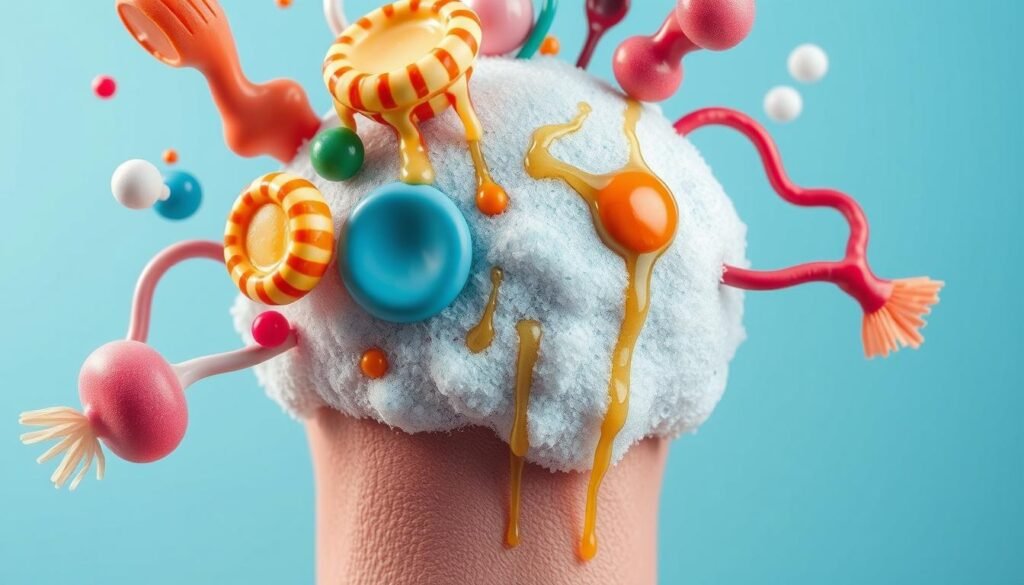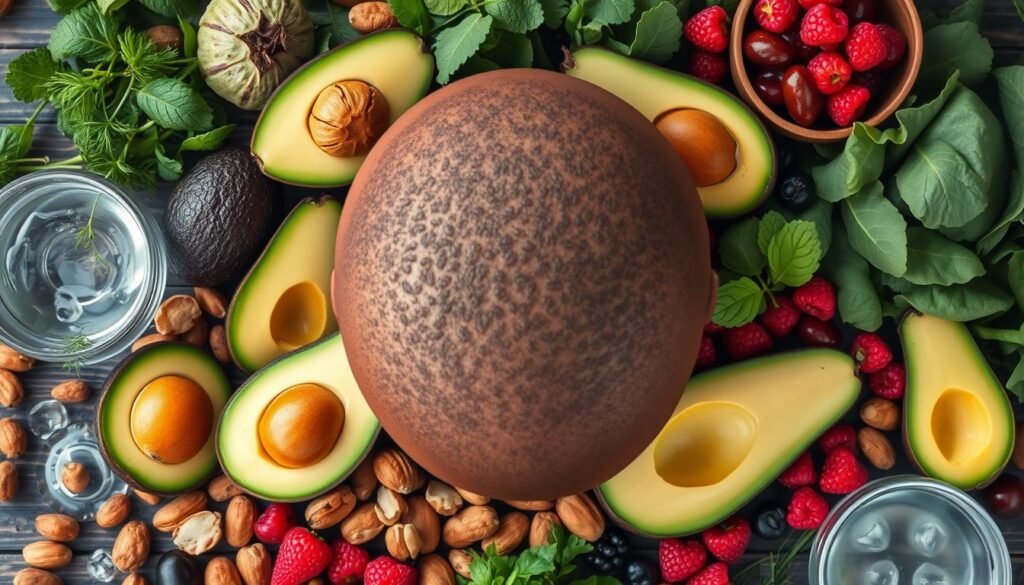Did you know that too much sugar can cause inflammation throughout your body? This includes your scalp. Over 100 million Americans suffer from obesity and diabetes due to high sugar intake. These conditions do not just affect your weight. They can also harm your hair. This article will explain how sugar and scalp health are linked. It will show how eating too much sugar can cause hair loss. We will look at how sugar affects hair follicles and scalp health.
Dermatology experts are raising awareness about the dangers of high sugar diets for hair. Inflammation, poor nutrient absorption, and hormone imbalances are key factors. They explain how sugar harms the scalp. Understanding the link between sugar and hair loss shows the power of our diet. It underlines the importance of food choices for keeping our scalp and hair healthy. For more information, check out this detailed guide.
Key Takeaways
- Excessive sugar intake can lead to inflammation, impacting hair growth and scalp health.
- High insulin levels from excessive sugar can trigger increased production of androgens, contributing to hair loss.
- A diet rich in sugar can change hair texture, making it dry and brittle.
- Glycation caused by sugar may damage hair follicles, leading to thinning and frailty.
- Managing sugar consumption is crucial for maintaining healthy scalp and hair.
Understanding Scalp Health
Scalp health is key to having healthy, strong hair. Our scalp has over 100 trillion tiny microbes that form a microbiome. This microbiome fights off bad germs and keeps our scalp healthy. Any upset in this balance can cause itchiness, dandruff, and even hair loss.
Things like our age, what we eat, where we live, and how we take care of our hair all affect our scalp’s health. Getting enough Vitamin D3, iron, and zinc is crucial. They help keep our scalp’s ecosystem stable. A happy scalp means hair follicles can do their job well, leading to better hair growth.
Many hair products have sulphates that could harm our scalp by causing itchiness and flaky skin. It’s important to pick gentle products to keep our scalp’s natural balance. When our scalp’s health goes down, fungi like the Malassezia species can grow because of oil buildup. This can lead to dandruff and other problems.
To keep a healthy scalp, we need to do several things. Using probiotics, managing stress, and eating a balanced diet help a lot. For more tips on how cutting down on sugar can boost scalp health, check out this informative guide.
| Factor | Impact on Scalp Health |
|---|---|
| Age | Affects oil production and skin elasticity |
| Diet | Provides necessary nutrients for balanced microbiome |
| Environment | Pollution and weather can irritate scalp |
| Hair Care Practices | Choosing appropriate products influences scalp balance |
Connection Between Diet and Hair Health
The link between what we eat and hair health is clear. Certain nutrients support hair follicles and spur growth. Biotin, zinc, iron, and vitamins A, C, and E are crucial for this. A healthy diet filled with these can boost scalp health and make hair stronger. But, a poor diet might mean less energy for hair growth.
Eating too much sugar can harm your hair. It can lead to inflammation, messing with the hair growth cycle. This might cause more hair to fall out. Given we have around 100,000 hair follicles, keeping them healthy is key for thick, shiny hair. Eating whole foods like vegetables and fruits helps control sugar levels.
If you want better hair, think about eating less sugar. Check out this article for tips on reducing sugar. Choose foods rich in nutrients for strong hair growth.
Impact of Sugar on Scalp Health
Eating too much sugar can really affect your scalp and hair. If you have a lot of sugar, you might find your hair getting thinner. This happens because sugar can mess with your hormones and nutrients.
How Sugar Can Lead to Hair Loss
High sugar levels can cause problems for your scalp, too. They can make you resistant to insulin, which isn’t good for your hair. Those who might lose hair could see it get worse with sugar.
Too much sugar leads to more DHT production, a hormone that makes hair thin. Sugar also causes inflammation and can mess with your hair’s growth. Not getting enough biotin and zinc can make your hair weak and lead to loss.
Glycation and its Effect on Hair Follicles
Impact of Sugar on Scalp Health is important when talking about glycation. Glycation happens when sugar sticks to proteins, hurting your scalp’s health. This can make your hair follicles get old faster and affect your hair growth.
This damage to proteins makes it hard for hair to stay strong and thick. Cutting down on sugar is key to keeping your scalp and hair healthy. It helps to prevent hair from getting thin.
The Role of Refined Carbs and Sugar
Knowing how refined carbs affect scalp health is key for shiny hair. Foods like white bread and sugary snacks harm your scalp. They lack vital nutrients and cause inflammation, hurting hair follicles.
Effects of Refined Carbs on Scalp Health
Studies show that diets rich in simple carbs may harm your hair. They can lead to more sebum and inflammation. Eating well, including diverse whole foods, helps protect your scalp. For healthy scalp tips, see this detailed guide on scalp hygiene practices.
Inflammation Triggered by High Sugar Intake
Too much sugar causes inflammation, research confirms. It raises insulin and androgen levels, thinning hair over time. This not only hurts your scalp but also speeds up hair loss. Lowering sugar intake is crucial for a healthy scalp and to prevent hair damage.

| Food Type | Impact on Scalp Health |
|---|---|
| Refined Sugars | Increases inflammation and sebum production |
| White Bread | Promotes unhealthy scalp environment |
| Fried Foods | Can damage hair follicles |
| Whole Foods | Support healthy hair growth and scalp |
Insulin Resistance and Hair Thinning
Insulin resistance is a big deal for hair health, especially when talking about hair thinning. When there’s too much sugar in our diet, it can mess up how our hair grows. This mess-up can make more hair follicles go to sleep, leading to thinner patches of hair as time goes by. People with diabetes, who often have insulin resistance, might see more hair falling out than others.
In a study, there were 850 cases of serious hair loss looked at. For those with diabetes, the chance of losing a lot of hair was higher, especially if they had diabetes for over ten years. This shows how closely tied insulin resistance and losing hair can be. So, keeping blood sugar levels in check is key.
For women of African origin, the situation is even more pressing. About 5% face Central Centrifugal Cicatricial Alopecia (CCCA). And, a big 17.6% of these women with bad hair loss also have type 2 diabetes. This is way more than the 5.7% who don’t have such severe hair thinning. This fact shines a light on the critical role of managing insulin resistance for healthier hair.
Hormonal Imbalances Caused by Sugar
Eating a lot of sugar doesn’t just affect your weight. It can also cause hormonal imbalances. When you eat too much sugar, your body makes too much insulin. This can lead to insulin resistance.
This imbalance messes with your hair’s growth cycle. It might cause you to lose more hair over time.
The Impact of High Insulin Levels
High insulin boosts androgen production, like DHT. DHT can make hair follicles smaller. This happens especially in those with androgenetic alopecia.
When hormones are out of balance, hair follicles can’t get what they need. This leads to weaker follicles and more hair falling out.
Eating foods with key vitamins and minerals can help. Biotin, zinc, iron, and vitamins A, C, and E are crucial for hair health. For example, vitamin C helps make collagen and improves iron absorption. This is important for hair growth.
A balanced diet can help fight off the bad effects of hormonal imbalances due to sugar. Understanding how sugar affects your hormones can help you make better food choices. For more details on sugar and hair loss, check out this helpful article.

Candida Overgrowth and Scalp Issues
Eating lots of sugar can create a perfect home for fungus growth, especially Candida on the scalp. This fungus loves sugar and can grow more because of it. This may lead to scalp problems.
How Sugar Consumption Affects Fungal Growth
High sugar levels can upset the body’s balance, making yeast overgrow. People with diabetes are more at risk for these infections. Their body’s condition can help Candida grow.
Not controlling blood sugar well can make this fungus grow faster. So, it’s important to watch your sugar intake to keep your scalp healthy.
Identifying Symptoms of Candida Overgrowth
Knowing Candida’s signs can help tackle scalp problems early. Common symptoms include:
- Itching or irritation on the scalp
- Scaling or flaking skin
- Red or patchy rashes
- Pus-filled pimples or soft white areas
It’s crucial to spot these signs early. If not, Candida Overgrowth can get worse, causing more discomfort and damaging scalp health.
Sugar Cravings and Dandruff
A diet high in sugar leads to Sugar Cravings. This causes unhealthy eating habits. People eat more sugary foods, which hurts their scalp health. Too much sugar can make dandruff worse. It makes scalp inflammation worse and messes up the scalp’s oil balance.
It’s important to know healthy adults should only have 20-25 grams of sugar a day. For those with obesity, the limit is 10 grams. The American Heart Association says women should keep it under 25 grams. Men should stay below 38 grams, and children should only have up to 12 grams. This helps keep the body and scalp healthy.
Too much sugar causes inflammation, making it hard for the body to get nutrients. This can make dandruff worse. It leads to dry skin and more scalp problems. Excess sugar also harms hair follicles. This increases the chance of losing hair.
Many don’t know it takes 21 days to break a sugar habit. Knowing this helps people eat better. This benefits their hair and scalp health.
Benefits of an Anti-Inflammatory Diet for Scalp Health
Embracing an Anti-Inflammatory Diet for Scalp health brings many advantages. It focuses on whole foods, healthy fats, and nutrients for better well-being. These choices help cut down inflammation that might affect the scalp.
Eating fresh fruits, vegetables, lean proteins, and omega-3 fatty acids is key for a healthy scalp. This leads to thicker, healthier hair. Studies show how certain foods positively affect hair:
- Consuming raw vegetables and fresh herbs at least three times a week significantly reduces the risk of developing androgenetic alopecia.
- A gluten-free diet has shown to stimulate hair growth in alopecia areata patients with celiac disease.
- Sufficient protein intake is essential, revealing that about 90% of androgenetic alopecia patients exhibit protein deficiencies.
Foods high in added sugar and refined carbs can boost inflammation. Avoiding these foods can lower inflammation and benefit scalp health.
| Anti-Inflammatory Foods | Benefits for Hair Health |
|---|---|
| Salmon | Rich in omega-3 fatty acids, promoting nourishment for hair follicles. |
| Legumes (lentils, kidney beans) | Packed with biotin, zinc, and iron, crucial for healthy hair growth. |
| Healthy Nuts (brazil nuts, walnuts) | Contain selenium, zinc, and alpha-linolenic acid beneficial for hair growth. |
| Chicken | A good source of protein essential for overall hair health. |
| Greens (kale, seaweed) | Provide vital vitamins and minerals that support scalp health. |
| Sweet Potatoes | Rich in beta-carotene, promoting healthy hair and reducing oxidative stress. |
Low-Carb Diet for Healthy Scalp
Switching to a low-carb diet can greatly boost your scalp’s health. By lowering sugar, you can improve insulin sensitivity, which is key for hair growth. High sugar levels can lead to hair loss and other scalp problems. Reducing sugar can thus promote healthier hair and a fresher scalp.
How Cutting Sugar Can Improve Scalp Health
By eating less sugar, you can lessen scalp inflammation and lower sebum production. This helps avoid issues like androgenetic alopecia and telogen effluvium, both tied to sugar. Cutting sugar can also make your hair feel better and your scalp healthier.
Healthy Alternatives to Sugar-Rich Foods
Moving to a low-carb diet introduces lots of good food choices. Here are some great swaps:
- Fresh fruits like berries are low in sugar but rich in antioxidants.
- Nuts offer vital fats and protein, boosting hair health.
- Whole grains provide lasting energy without sugar highs.
Adding these foods to your diet covers nutritional needs while keeping cravings in check. Trying the Low-Carb Diet for Healthy Scalp shows positive effects, promoting a balanced diet for scalp health.

| Food Type | Benefits |
|---|---|
| Fresh Berries | High in antioxidants, low in sugar |
| Nuts | Rich in healthy fats and proteins |
| Whole Grains | Provides complex carbohydrates, sustained energy |
Conclusion
Eating too much sugar can really affect your scalp and hair growth. It can lead to missing out on key nutrients needed for healthy hair. It’s best to eat foods rich in biotin, zinc, iron, and vitamins A, C, and E to keep your scalp in good shape.
Also, too much sugar can mess with your hormones and harm your scalp. It can cause insulin resistance, which increases DHT levels. DHT is a hormone that can make hair thin and lead to baldness. Cutting back on sugar can help keep hormones balanced, lessen inflammation, and promote hair growth.
Choosing to eat healthier is great for your scalp and gives you more energy. By eating less sugar, you can improve your hair health. This way, you fight the bad effects sugar has on your scalp.